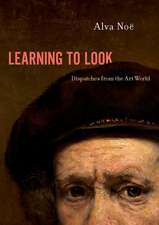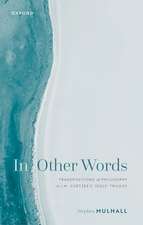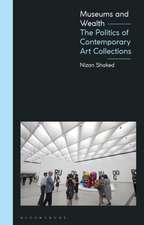The Politics of Aesthetics: Bloomsbury Revelations
Editat de Gabriel Rockhill Autor Jacques Rancièreen Limba Engleză Paperback – 24 apr 2013
Din seria Bloomsbury Revelations
-
 Preț: 125.75 lei
Preț: 125.75 lei - 13%
 Preț: 154.75 lei
Preț: 154.75 lei - 18%
 Preț: 177.18 lei
Preț: 177.18 lei - 19%
 Preț: 175.68 lei
Preț: 175.68 lei - 7%
 Preț: 109.19 lei
Preț: 109.19 lei - 14%
 Preț: 132.26 lei
Preț: 132.26 lei - 18%
 Preț: 180.74 lei
Preț: 180.74 lei - 19%
 Preț: 175.85 lei
Preț: 175.85 lei - 7%
 Preț: 166.95 lei
Preț: 166.95 lei - 11%
 Preț: 183.45 lei
Preț: 183.45 lei - 14%
 Preț: 145.64 lei
Preț: 145.64 lei - 7%
 Preț: 163.86 lei
Preț: 163.86 lei - 15%
 Preț: 143.65 lei
Preț: 143.65 lei - 13%
 Preț: 156.03 lei
Preț: 156.03 lei - 19%
 Preț: 175.39 lei
Preț: 175.39 lei - 23%
 Preț: 133.61 lei
Preț: 133.61 lei - 18%
 Preț: 180.74 lei
Preț: 180.74 lei - 7%
 Preț: 155.79 lei
Preț: 155.79 lei - 9%
 Preț: 130.91 lei
Preț: 130.91 lei - 19%
 Preț: 175.39 lei
Preț: 175.39 lei - 22%
 Preț: 134.95 lei
Preț: 134.95 lei - 14%
 Preț: 173.44 lei
Preț: 173.44 lei - 18%
 Preț: 170.11 lei
Preț: 170.11 lei - 8%
 Preț: 191.36 lei
Preț: 191.36 lei - 24%
 Preț: 150.61 lei
Preț: 150.61 lei - 18%
 Preț: 177.79 lei
Preț: 177.79 lei - 13%
 Preț: 177.62 lei
Preț: 177.62 lei - 8%
 Preț: 159.61 lei
Preț: 159.61 lei - 13%
 Preț: 128.12 lei
Preț: 128.12 lei - 8%
 Preț: 160.87 lei
Preț: 160.87 lei - 12%
 Preț: 158.74 lei
Preț: 158.74 lei - 13%
 Preț: 169.91 lei
Preț: 169.91 lei - 19%
 Preț: 144.12 lei
Preț: 144.12 lei - 19%
 Preț: 174.95 lei
Preț: 174.95 lei - 13%
 Preț: 155.87 lei
Preț: 155.87 lei - 19%
 Preț: 174.51 lei
Preț: 174.51 lei - 13%
 Preț: 170.80 lei
Preț: 170.80 lei - 18%
 Preț: 180.27 lei
Preț: 180.27 lei - 8%
 Preț: 145.57 lei
Preț: 145.57 lei - 18%
 Preț: 177.18 lei
Preț: 177.18 lei -
 Preț: 174.91 lei
Preț: 174.91 lei - 12%
 Preț: 160.73 lei
Preț: 160.73 lei - 7%
 Preț: 108.51 lei
Preț: 108.51 lei - 18%
 Preț: 173.48 lei
Preț: 173.48 lei - 23%
 Preț: 133.15 lei
Preț: 133.15 lei - 12%
 Preț: 171.56 lei
Preț: 171.56 lei -
 Preț: 152.57 lei
Preț: 152.57 lei - 13%
 Preț: 136.99 lei
Preț: 136.99 lei - 7%
 Preț: 108.72 lei
Preț: 108.72 lei
Preț: 131.38 lei
Preț vechi: 153.63 lei
-14% Nou
Puncte Express: 197
Preț estimativ în valută:
25.14€ • 26.25$ • 20.81£
25.14€ • 26.25$ • 20.81£
Carte disponibilă
Livrare economică 14-28 martie
Livrare express 27 februarie-05 martie pentru 33.26 lei
Preluare comenzi: 021 569.72.76
Specificații
ISBN-13: 9781780935355
ISBN-10: 1780935358
Pagini: 144
Dimensiuni: 138 x 216 x 13 mm
Greutate: 0.21 kg
Editura: Bloomsbury Publishing
Colecția Bloomsbury Academic
Seria Bloomsbury Revelations
Locul publicării:London, United Kingdom
ISBN-10: 1780935358
Pagini: 144
Dimensiuni: 138 x 216 x 13 mm
Greutate: 0.21 kg
Editura: Bloomsbury Publishing
Colecția Bloomsbury Academic
Seria Bloomsbury Revelations
Locul publicării:London, United Kingdom
Caracteristici
Offers interlinked interviews with one of the leading French Philosophers writing today.
Notă biografică
Jacques Rancière taught at the University of Paris VIII, France, from 1969 to 2000, occupying the Chair of Aesthetics and Politics from 1990 until his retirement. Gabriel Rockhill is Assistant Professor of Philosophy at Villanova University, USA. He also teaches at the Centre Parisien d'Etudes Critiques and the Collège International de Philosophie, France. He is the author of Logique de l'histoire: Pour une analytique des pratiques philosophiques (Editions Hermann, 2010) and Pour un historicisme radical: Entre esthétique et politique avec Rancière (Editions du Sandre, forthcoming).
Cuprins
Translator's preface: The Reconfiguration of Meaning Translator's Introduction: Jacques Ranciere's Politics of Perception \ The Politics of Aesthetics \ Foreword \ The Distribution of the Sensible: Politics and Aesthetics Artistic Regimes and the Shortcomings of the Notion of Modernity \ Mechanical Arts and the Promotion of the Anonymous \ Is History a Form of Fiction? On Art and Work \ Interview with Jacques Ranciere for the English Edition: The Janus-Face of Politicized Art \ Historical and Hermeneutic Methodology \ Universality, Historicity, Equality \ Positive Contradiction \ Politicized Art \ Afterword by Slavoj Zizek: The Lesson of Ranciere \ Appendix I: Glossary of Technical Terms \ Appendix II: Bibliography of Primary and Secondary Sources \ Index.
Recenzii
"Jacques Rancière is one of the most important and original contemporary French philosophers. This book provides perhaps the best available introduction to his thought in English. Its main contents are two interviews with Rancière...they provide an extraordinarily concise and systematic summary by Rancière of the main themes of his recent work across its whole range. Rancière's project is promising. It is illuminating to see aesthetics as political and politics in aesthetic terms, as a form of the 'distribution of the sensible.'" -Culture Machine
"[A]n excellent introduction to Jacques Rancière...Slavoj Zizek writes in his afterword: 'Rancière's thought is today more actual than ever: in our time of the disorientation of the left, his writings offer one of the few consistent conceptualizations of how we are to continue to exist.'" - London Review of Books, August 3, 2006
'Ranciere has insightful and novel things to say about the problems that beset our understanding of modernity as it applies to art.'
'Locating the political significance of art has not only gone out of fashion, it has in recent years become a source of embarrassment. No one has argued against this repression with more precision, nuance, and undeniable force than Jacques Ranciere ... This book, with an emphatic "Afterword" by Zizek, provides a riveting and compelling outline of the central elements of Ranciere's politics of aesthetics and its relation to his demanding rethinking of the political.'
'A benchmark, this compact book shows why Ranciere is one of the most compelling thinkers and writers in France since Michel Foucault and Gilles Deleuze.'
'This is possibly the most important essay, despite its length, since Adorno's Aesthetic Theory.'
'A tour de force! Through a revitalisation of the term 'aesthetics', Ranciere is able to raise novel questions concerning the nature of history, the sense of our modernity, the relationship between work and art and between science and art, and the peculiarity of aesthetic experience (showing, in essence, that it cannot be contained but informs all our forms of life and activities).'
'The readership for Ranciere's work is highly interdisciplinary. Le Partage du sensible would be obligatory reading in graduate courses in Philosophy, Aesthetics, Political Science, French Studies, Literature, and Cultural Studies, where it would be read in the context of other major thinkers of politics and aesthetics such as Walter Benjamin, Jean-Paul Sartre, Roland Barthes, Jacques Derrida, Etienne Balibar, Michel Foucault, Paul Ricoeur, Jurgen Habermas, Jean-Francois Lyotard, and Slavoj Zizek.'
"[A]n excellent introduction to Jacques Rancière...Slavoj Zizek writes in his afterword: 'Rancière's thought is today more actual than ever: in our time of the disorientation of the left, his writings offer one of the few consistent conceptualizations of how we are to continue to exist.'" - London Review of Books, August 3, 2006
'Ranciere has insightful and novel things to say about the problems that beset our understanding of modernity as it applies to art.'
'Locating the political significance of art has not only gone out of fashion, it has in recent years become a source of embarrassment. No one has argued against this repression with more precision, nuance, and undeniable force than Jacques Ranciere ... This book, with an emphatic "Afterword" by Zizek, provides a riveting and compelling outline of the central elements of Ranciere's politics of aesthetics and its relation to his demanding rethinking of the political.'
'A benchmark, this compact book shows why Ranciere is one of the most compelling thinkers and writers in France since Michel Foucault and Gilles Deleuze.'
'This is possibly the most important essay, despite its length, since Adorno's Aesthetic Theory.'
'A tour de force! Through a revitalisation of the term 'aesthetics', Ranciere is able to raise novel questions concerning the nature of history, the sense of our modernity, the relationship between work and art and between science and art, and the peculiarity of aesthetic experience (showing, in essence, that it cannot be contained but informs all our forms of life and activities).'
'The readership for Ranciere's work is highly interdisciplinary. Le Partage du sensible would be obligatory reading in graduate courses in Philosophy, Aesthetics, Political Science, French Studies, Literature, and Cultural Studies, where it would be read in the context of other major thinkers of politics and aesthetics such as Walter Benjamin, Jean-Paul Sartre, Roland Barthes, Jacques Derrida, Etienne Balibar, Michel Foucault, Paul Ricoeur, Jurgen Habermas, Jean-Francois Lyotard, and Slavoj Zizek.'









